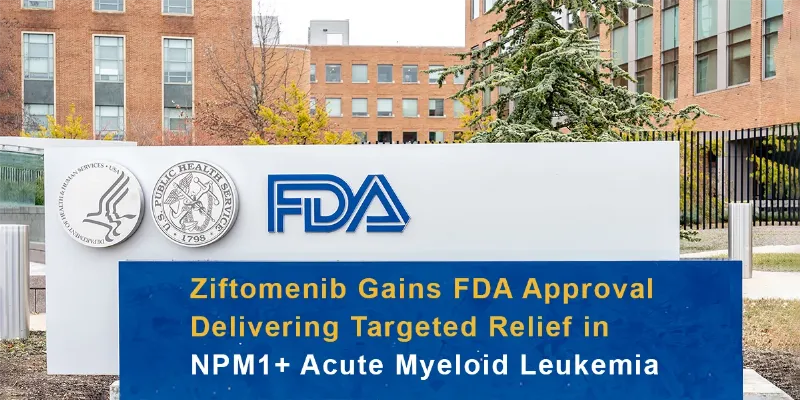FDA Approves Ziftomenib as a New Targeted Option for NPM1+ Acute Myeloid Leukemia

14 November 2025
The FDA has approved ziftomenib (KOMZIFTI), an oral menin inhibitor for adults with relapsed or refractory NPM1-mutated acute myeloid leukemia (AML). In the KOMET-001 trial, the therapy achieved a 21.4 percent rate of complete remission plus complete remission with partial hematologic recovery and a median response duration of five months, with manageable toxicity and the convenience of once-daily oral administration.
Kura Oncology announced that the U.S. Food and Drug Administration (FDA) has approved ziftomenib (KOMZIFTI), a first-in-class oral menin inhibitor, for adults with relapsed or refractory (R/R) acute myeloid leukemia (AML) harboring an NPM1 mutation. Ziftomenib is the first and only once-daily oral menin inhibitor approved for R/R NPM1-mutated AML, a challenging disease with limited therapeutic options, marking an important advance in precision treatment for this genetically defined subgroup.
A New Option for a Difficult-to-Treat Population
NPM1 mutations occur in roughly 30% of AML cases, making them one of the most frequent genetic drivers of the disease. While patients with NPM1-mutated AML often respond to initial therapy, relapse remains common and outcomes after recurrence are poor, leaving few effective treatment options. Ziftomenib, developed by Kura Oncology in collaboration with Kyowa Kirin, is the first and only once-daily oral therapy specifically approved for this subgroup.
“KOMZIFTI addresses a critical need for adult patients with R/R NPM1-m AML, many of whom are older and unable to tolerate intensive chemotherapy or transplant,” said Dr. Eunice Wang, Chief of the Leukemia Service and Professor of Oncology at Roswell Park Cancer Center. “The clinical data demonstrate deep and durable responses with a manageable safety profile for patients on multiple concurrent medications. This approval equips physicians with a new oral therapy to integrate into care and improve outcomes for this vulnerable patient population.”
Efficacy and Safety in the KOMET-001 Trial
Approval was based on results from KOMET-001 (KO-MEN-001, NCT04067336), an open-label, multicenter study that evaluated ziftomenib in 112 adults with R/R NPM1-mutated AML identified by next-generation sequencing or PCR. The overall complete remission (CR) plus CR with partial hematologic recovery (CRh) rate was 21.4% (95% CI: 14.2–30.2), with a median duration of response of 5 months (95% CI: 1.9–8.1). The CR rate was 17%, and CRh was 4.5%.
Responses were typically rapid, with 88% of responders achieving remission within 6 months of treatment initiation. Among patients who were dependent on red blood cell or platelet transfusions at baseline, 21% achieved transfusion independence, highlighting the clinical benefit beyond response rates.
Manageable Safety Profile
The safety profile of ziftomenib was characterized by manageable toxicity and broad compatibility with commonly used supportive therapies. The most common adverse events (≥20%) included transaminase elevations, infections, diarrhea, nausea, fatigue, and differentiation syndrome. Importantly, while the prescribing information includes a warning for differentiation syndrome, there is no Boxed Warning for QTc prolongation or Torsades de Pointes, a distinction from several other targeted agents in AML.
QTc prolongation of any grade occurred in 10% of older patients, with no grade 4 or 5 events reported. The absence of clinically meaningful drug–drug interactions further simplifies integration into care, particularly for older adults receiving multiple medications.
Expanding the Role of Menin Inhibition
By targeting the menin–MLL (KMT2A) interaction, ziftomenib disrupts a key transcriptional pathway driving leukemogenesis in NPM1-mutated AML. The approval underscores growing interest in menin inhibition as a therapeutic strategy in genetically defined myeloid malignancies.
Toward Earlier Use in AML
Kura Oncology and Kyowa Kirin are advancing the development of ziftomenib in front-line AML with NPM1 mutations, KMT2A translocations, or FLT3 mutations, exploring its use in combination with standard therapies. The companies’ global collaboration, established in 2024, aims to expand access and accelerate development across indications.











Comments
No Comments Yet!